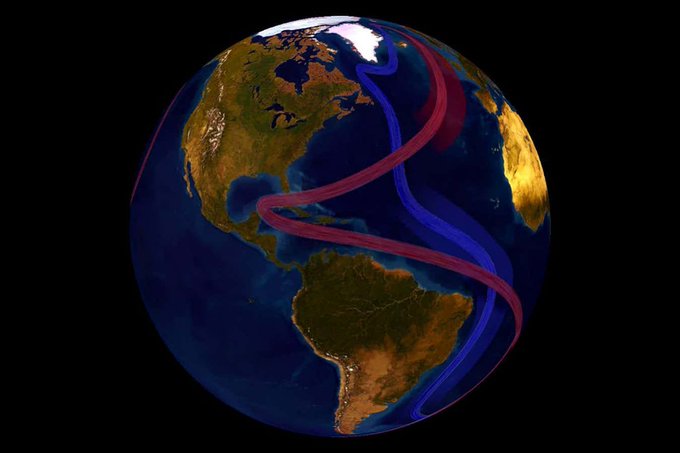VITAL ATLANTIC OCEAN CURRENT IS ALREADY WEAKENING DUE TO MELTING ICE

By: James Woodford
Photo: New Scientist
A vital ocean current that transports warm water to the North Atlantic is weakening faster than previously thought, according to models that simulate the impact of meltwater from the Greenland ice sheet. A study modelling the impact of melting ice suggests scientists have underestimated the risk that an important ocean current will shut down and cause climate chaos
Given the pace at which the world is now overshooting its emissions targets and the rate at which Greenland’s ice sheet is melting, the researchers say the current’s strength could fall by as much as a third within 15 years.
The Atlantic meridional overturning circulation (AMOC) is like an oceanic conveyor network that moves warmer waters from the equator to the North Atlantic, and takes cool water from high northern latitudes southward in the deep ocean.
For decades, researchers have warned that if the AMOC were to break down, it would result in increasing climate chaos across the globe, including a drop in temperatures in Europe and disruptions to the monsoonal rains in Asia.
The Intergovernmental Panel on Climate Change (IPCC) says most climate models project that the AMOC will slow in the later 21st century under most emissions scenarios, but that a shutdown of the current before 2100 is “very unlikely”.
However, these models don’t fully include the effects of fresh water entering the Atlantic from the Arctic.
Gabriel Pontes and Laurie Menviel at the University of New South Wales, Australia, have now used computer models to study the past and future impact of this meltwater.
When fresh water from melting ice reaches the ocean, it disturbs layers of denser water below the surface. This, in turn, triggers slow-moving waves called Kelvin and Rossby waves that take decades to travel southwards.
The models suggest the AMOC has been slowing down at 0.46 sverdrups per decade since 1950 – each sverdrup equating to a million cubic metres of water per second.
“We are showing that, over the last 70 years, the oceanic circulation weakened due to the meltwater from the Greenland and Canadian Arctic,” says Pontes. “It will force a faster and stronger weakening than the IPCC has predicted.”
Pontes says the IPCC needs to update its formal forecasts for the AMOC’s slowing. While the study doesn’t predict when the current may stop altogether, he says this could occur suddenly and unexpectedly.
“AMOC should be delivering the warm water from the tropics to the North Atlantic, but instead it will be delivered to the southern part of the globe,” says Pontes. “If the AMOC stops, it will drastically disrupt the distribution of heat on Earth.”
Earlier this year, another study by René van Westen at Utrecht University in the Netherlands and his colleagues suggested that the AMOC could collapse between 2037 and 2064, primarily based on modelling of salinity data.
Van Westen agrees that the IPCC needs to update its projections. “The main takeaway from this new study is that climate models are again too biased and that AMOC weakening and possibly a collapse is likely underestimated in the current generation of climate models,” he says.
Stefan Rahmstorf at the Potsdam Institute for Climate Impact Research in Germany says the new study shows there is a much greater likelihood that the AMOC will weaken faster than previously thought and may pass a tipping point at which it collapses.
“It confirms what many have suspected, but what hasn’t been shown explicitly before,” says Rahmstorf. “Climate models have underestimated the anthropogenic AMOC weakening until now because they neglect the increase in freshwater influx from Greenland melting and other sources.”
But Sang-Ki Lee at the US National Oceanic and Atmospheric Administration, who has been critical of predictions that the AMOC will imminently collapse, is more cautious.
The study assumes that Greenland ice started melting in 1960 and before that it was zero, which he says is “unrealistic”. “So, the estimated ice melting-induced weakening of the AMOC during the historical period may not be reliable,” he says.




